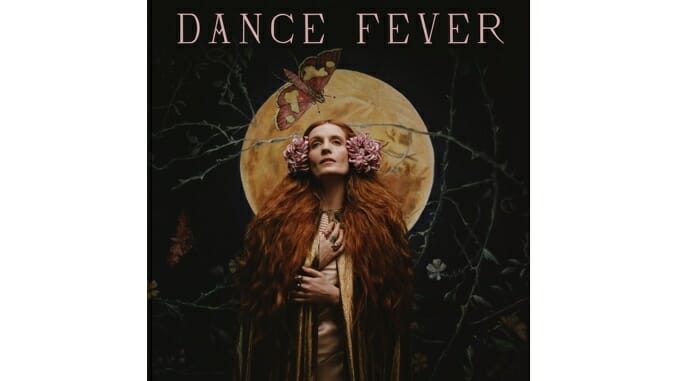Florence + The Machine Cry Freedom on Dance Fever
The U.K. band draw on everything from Springsteen to festival EDM on their diverse, captivating fifth album

The music of Florence The Machine is consistently singular. The band, led by Florence Welch, have been performing bewitching baroque pop since the late aughts. While their music has become higher in fidelity as their star has risen, they’ve never abandoned their sweeping gothic ambitions. Though they have their occasional moments of stirring quiet, they’re a group best suited to huge, uproarious songs. Welch is a charismatic performer, often possessed by the power of her own music, and is prone to leaping and bounding around the stage, sometimes running through a theater’s aisles. While writing the songs that would, years later, become Dance Fever, the band’s fifth album, Welch read about choreomania, the Middle Ages concept of being so lost in euphoria that one dances themself to death—an idea that would naturally fascinate someone so morbidly devoted to performance. These songs would have to reflect this compulsion in their sound and structure, building them to feel at home onstage. After enlisting pop hitmaker Jack Antonoff, the pandemic began just a week into recording sessions, forcing Welch back to both London and square one. While unable to meet in person, she worked remotely with Antonoff and Glass Animals’ Dave Bayley. The resulting songs are some of the most captivating Florence The Machine have made in years, and exist as a hellish rebuke against stillness.
The opener, “King” is the rare moment when Welch’s sights are set on the stifling nature of gender expectations. Blessed with a pleasant, trotting drum beat, she sounds totally in control as she performs her trademark vocal acrobatics. The lyrics tell the story of Welch eschewing the traditional roles forecasted for her, instead forging her own path. As the song nears its end, Welch cries out, the drums hit even harder, and we’re reminded once again just how much this band can do in moments of all-consuming chaos. The amount of anger swirling beneath the surface of “King” gets drawn out further on the stellar “Girls Against God,” a song that Welch calls “old testament style fury” at the thought of not being able to perform again; it is a glorious moment of misty-eyed vulnerability from a band so often dressed up in fairytales. “Oh, it’s good to be alive / Crying into cereal at midnight / And if they ever let me out / I’m gonna really let it out,” she sings on its refrain; it’s as important to show the phase of confinement as it is to show the cry of freedom.
-

-

-

-

-

-

-

-

-

-

-

-

-

-

-

-

-

-

-

-

-

-

-

-

-

-

-

-

-

-

-

-

-

-

-

-

-

-

-

-








































